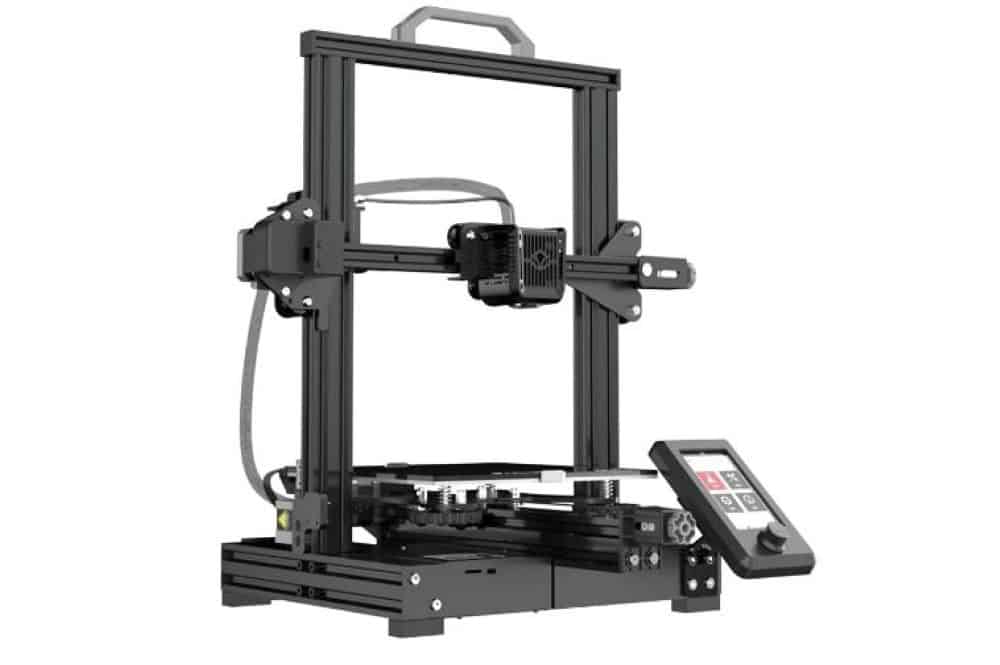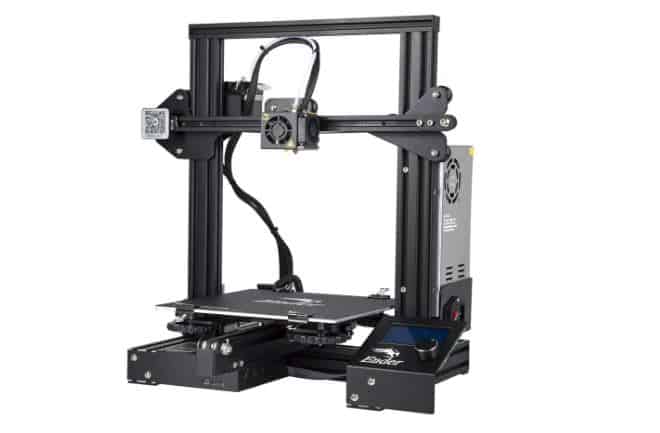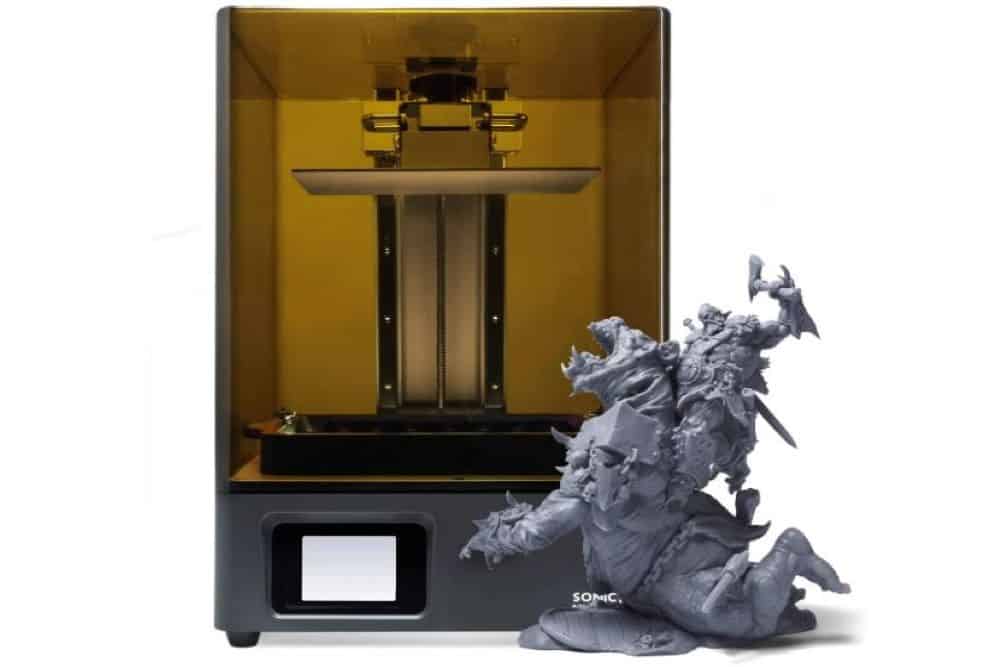Do you want to know how to make money with your 3D printer? Then, read my article on the best 3D printer for miniatures to gain knowledge.
3D printers have different varieties, types, and costs depending on the technology they use in making them.
So, in this article, I will let you know everything that has to do with a 3D printer and its uses.
Also, you will know the benefits and drawbacks of using miniature 3D printers. Likewise, the buying guides that have to do with the features/factors to consider will follow suit.
Furthermore, the recommendation will portray the different trending 3D printers to ease your stress when you plan to get them. Based on the best seller and customer ratings, they will also be in descending order.
However, I recommend the “Phrozen Sonic Mighty 4K Large LCD Resin 3D Printer” as my best pick of 3D printers for miniatures.
Similarly, the frequently asked questions and answers will further clear up all of your confusion and questions about this printer.
Subsequently, my final thoughts will summarize this article and wrap up everything you need to know about the best 3D printer for miniatures.
Finally, it will clarify every doubt about this printer and explain why you need one around you.
Therefore, dive in and read to the end for more details. Happy reading.
Overview: Best 3D Printer For Miniatures
The 3D printer for miniatures uses a three-dimensional digital model to make a physical object.
It is the process of making physical objects using a 3D model to lay down many thin layers of materials in succession.
Also, you measure the performance of a printer by its resolution, which is what the printer uses in printing.
Using a printer to print a miniature can take 30 minutes to 210 hours, depending on your layer height.
In addition, the complexity of the Model and other slice settings need to be implemented.
Even so, the nozzle diameter and layer height are significant and will determine how long it takes to 3D print a miniature.
However, 3D printers are ideal for creating miniatures, making them great, reliable, and having high resolution. Also, the amazing clarity and details can reach high-resolution heights in the models.
Subsequently, the best and most moderate 3D printer for miniatures is one with a 4K resolution or more, although a printer with a 2K resolution can work.
If you want to start a 3D printing resin cure under UV light, you will pull the building out and remove the model from it.
Furthermore, the best UV light and the most cost-effective source is sunlight.
Although, in most cases, it is rarely unavailable, making yourself a cheap option with UV LED tape and a paint bucket will be better.
The UV you made is also a low-cost option. However, it is brittle, cracked, and wrapped in overexposure, which is why you require a dedicated cure station.
You can get notable functions of wash and cure stations available from most manufacturers of 3D printers.
Pros And Cons: Best 3D Printer For Miniatures
Pros
Cost reduction
A 3D printer has lower machine, material, and labor costs.
These machine operation, labor, and material costs make up a company’s manufacturing costs.
Also, I will talk briefly about each of them.
- Machine Costs: They have little impact on the cost of the manufacturing process. It comprises high energy to create parts and the ability to develop and create complex parts and products. This increases the level of efficiency, saves time, and offsets the cost of running the machine.
- Labor Cost: Also, 3D printing helps keep labor costs low, unlike traditional. It only requires an operator to start the machine and start the automated process of creating the uploaded design.
- Material Costs: The growing range of 3D printer filaments used for 3D printing makes it possible for the price to decrease.
- Fewer Travel Costs: 3D printing reduces the distance a product will travel. Also, 3D printers create a product from start to finish. It enables the designers to produce products in one country and email them to another country in preparation for production.
Less Waste, More Sustainability
3D printers are more sustainable and have less waste, unlike the traditional manufacturing process
It uses a subtractive process to waste and reuse materials, leading to high cost and waste.
3D printers use a unique way of additive manufacturing to build products with little waste.
As a result of this, it is a more sustainable option.
Reduce Time
The evolving world is now fast-paced, as everything requires quickness, and 3D printing can make a difference.
Time reduction is another advantage of 3D printing, as parts and products are manufactured a lot more quicker.
Provides An Enhanced Competitive Advantage
When you meet your clients’ time of delivery of a product, you beat your competitors.
The 3D printers for miniature help meet targets on time and boost your business and efficiency.
Also, it provides an enhanced competitive advantage to your business by reducing prototyping time.
Furthermore, it helps your businesses deliver better, improved, and enhanced products in a shorter period of time.
In addition, it makes it possible to develop more products and more frequently to the satisfaction of your clients.
Thus, it gives you an upper hand or competitive advantage over the competition.
Error Reduction
A good design produces a perfect or efficient product with less error.
Designing parts and products requires numerous steps, especially when using the traditional.
Some of the steps could result in errors that will make you start all over again or may result in problems in the overall manufacturing process.
As a result, 3D printers have a single-step manufacturing process that is more beneficial.
Most designs have a long and drawn-out production process, like creating a CAD model, then prototyping, which requires numerous adjustments before reaching final production.
But with 3D printing, it does not require interaction from the operators during processing and creates the product in a single step.
Therefore, the 3D printer remains a better choice in 3D printing over the traditional method.
It Is Confidential
Industries using a 3D printer continuously ensures the designs never leave the company premises, thus safeguarding intellectual property.
It does not allow a third party to claim your innovations for themselves.
Therefore, no more worries about the confidentiality of your work, as it keeps every one of your innovation designs in-house.
Production on Demand
The single manufacturing process in 3D printing yields the timely delivery of products and jobs.
Hence, they are reliable when it comes to one-off productions or production on demand.
Cons
You can not Leave it On Overnight.
Leaving the printer on overnight can cause issues, or something may go wrong when you leave it unattended.
Even though it does not require operator interaction during the process, you cannot leave it unattended, especially at night.
It may even catch fire, which is a potential problem if you see your printer on fire.
So, avoid leaving it on at night to prevent damage.
Also, do not sleep in the same room with a 3D printer.
Putting a 3D printer in the same room, you will be sleeping in is not good. Rather, you need to keep it somewhere else unless you have a good ventilation system with a HEPA filter.
You can not leave it unattended when running.
Leaving the printer on while you are away is not a good idea.
Hence, ensure you are present or around it when you are printing to avoid the issue.
Better still, make sure you reduce that risk by being present and not leaving it unattended.
Limited Materials
3D printing is selective in creating items with the available plastics and metals.
Also, the selection of raw materials is exhaustive because not all metals or plastics can be temperature controlled enough to allow 3D printing.
Additionally, many of these printable materials are not recyclable, and only a few are food safe.
Restricted Build size
Most 3D printers have small print chambers that restrict what you can print on them.
If you are to print anything bigger than the chambers, it has to be in separate parts.
Sometimes, it increases the cost and time to print larger parts because it has to print all these parts before manually joining them.
Large Volumes
Also, printing a large volume design in a 3D printer has a static cost, unlike conventional techniques.
It is because it has a small chamber and has to break and print these large works by parts.
After printing all the parts, the designer or operator will start joining them manually, which increases the cost and production time.
Post Processing
Apart from printing large works in parts in most 3D printers, it requires additional post-processing.
This post-processing includes water jetting, sanding, a chemical soak and rinse, air or heat drying, assembly, and others.
It helps remove support materials from the build and smooth the surface to achieve the required finishing.
Important Factors To Note When Buying A Good 3D Printer For Miniatures: Best 3D Printer For Miniatures
The following factors will help when planning to get a 3D printer for miniatures or businesses:.
Also, you understand how pricing works when it comes to 3D printing with these parameters. So pay good attention to them and read through them for proper understanding and benefit.
3D Model
The 3D Model is one of the most interesting things to consider when purchasing a 3D printer for miniatures.
After considering the purchase of a printer and the time it takes to print, the next thing is the Model of the 3D printer.
Also, it is the 3D model that gives us the essential information that can help us quote an accurate 3D print.
So, without the 3D Model, coming up with an accurate quote for a 3D print will be hard.
However, a 3D model comprises both the model volume and the complexity, which we will look into.
Model volume
The 3d Model helps you calculate the total number of models and includes the generated supports. This comprehensive volume entails how much material the 3d printer needs to print a file.
The more or larger the volume, the higher the cost of the printer or printing.
Subsequently, there are ways to reduce the cost of 3D printing.
For instance, a 5ft model can have less volume than a 3ft model if the 3ft model is solid on the inside while the 5ft model is hollow.
Therefore, it is essential to consider the price and the model of a 3D printer.
This is why coming up with an estimated price for 3D printing without the 3D model is difficult.
Complexity
3D models differ in type and variety. They are not equal.
Some 3D printers are 3D print-ready, while others are just plain crazy.
They require preparation and planning, though. In 3D printing services, it is automated, which makes transactions faster.
Cost of Buying And Running A 3D Printer
Another factor to consider is the cost of buying and running a 3D printer for your business.
Some machines with a small chamber are cheaper, while others have a bigger chamber with a high price tag.
Type Of Material
The type of material will also determine the 3D printer you will buy and how you will use it.
Also, the material you buy and the 3D printer must be compatible for efficient service and yield productivity.
Profit Margin
The post margin requires the right setting to be more profitable.
If you use it for public or general services, then the profit margin will be lower.
But if it is for private or individual services, then it will have a high-profit margin.
Cost of infill
Another factor is the cost of infill and how available it is in the market.
The infill density on any 3D print will affect the printing price.
High quality implies a high price, while lower quality will go with lower pricing.
Size of the object
The object size you will be printing will also determine the type or size of the 3D printer you purchase.
It will even affect the cost to a great extent and increase the purchase cost.
Also, when you want to price a large object, it will consume more filaments and eventually increase the printing price.
Layer Thickness
The layer thickness is also essential because it influences the printing price.
Also, if the thickness is greater, the time consumption for printing will be much greater, which will increase the electricity bill.
My recommendations And Specifications Table: Best 3D Printer For Miniatures
| Products Name | Dimensions | Item Weight | Compatible Material | Material | Brand |
| Voxelab Aquila X2 3D Printer with Full Alloy Frame | 18.9 x 18.62 x 18.62 inches | 18.08 pounds | Polyethylene Terephthalate Glycol, Polylactic Acid, Acrylonitrile Butadiene | Styrene Metal | Voxelab |
| Official Creality Ender 3 3D Printer Fully Open Source | 16.14 x 16.54 x 18.31 inches | 14.6 Pounds | Laptop, Personal Computer | Aluminum | Comgrow |
| FlashForge Adventurer 3 Lite FDM 3D Printer | 5.91 x 5.91 x 5.91 inches | 26.3 Pounds | Personal Computer Stainless, Pla | Steel | FLASHFORGE |
| Phrozen Sonic Mini 4K LCD Resin 3D Printer | 9.84 x 9.84 x 12.99 inches | 12.78 Pounds | Laptop, Personal Computer | Resin | Phrozen |
| Phrozen Sonic Mighty 4K Large LCD Resin 3D Printer | 11.81 x 11.81 x 18.5 inches | 27.5 Pounds | Resin | Resin | Phrozen |
5Voxelab Aquila X2 3D Printer with Full Alloy Frame

The “Voxelab Aquila X2 3D Printer with Full Alloy Frame” is in the 5th position on my list of the best 3D printer for miniature.
The Voxelab Aquila is an upgradable model of a 3D printer for miniatures made of an ergonomic screen.
It also supports filament detection and auto filaments feed/return, a function compatible with PLA, ABS, and PETG filaments.
Also, it has a fast heating and silent printing feature for more productive 3D printing and quick job delivery.
In addition, it does intelligent and smooth printing when power is off, and the printer can continue when power is on.
They also have a customer warranty and services for 12 months.
However, the semi-assembled kit is open for flexible upgrades and more modifications.
Lastly, the build surface plate is removable.
Pros
- It comes with a partially assembled and easy-to-setup kit.
- Also, it has flexible upgrades and modifications.
- In addition, the customer warranty and services are encouraging.
- Likewise, the fast heating and printing deliver work quickly.
- More so, the carbon-crystalline silicon glass provides strong adhesion.
- Furthermore, the super quiet design produces smooth printing.
- However, the carbon crystal silicon glass adheres to heat within 5 minutes.
- Lastly, it supports the PLA, ABS, and PETG filaments.
Cons
- It can be unreliable with its unstable print.
- Also, it can have a cross beam out of alignment.
- The machine upright is not square and can lean one way or another.
4Official Creality Ender 3 3D Printer Fully Open Source

Occupying 4th position on my list of the best 3D printer for a miniature is the “Official Creality Ender 3 3D Printer Fully Open Source”.
This is a 3D printer for miniatures with advanced extruder technology.
You can upgrade the extruder to reduce plugging risk and bad extrusion and enhance its performance.
Also, it has a V-shape with POM wheels to enable it to move noiselessly and design products smoothly and durably.
In addition, the manufacturers perform strict testing on the key components before delivering them.
However, it comes with lifetime technical support available all the time.
Furthermore, it has several assembled parts that take only 2 hours to assemble 20 nuts.
Lastly, they are capable of resuming printing functions after power elopement.
Pros
- The Ender 3 3D printer comes with advanced extruder technology.
- Also, it can resume printing options after a power failure.
- Even so, assembling parts is easy and quick.
- More so, it is noiseless, smooth, and durable.
- Furthermore, it comes with a safety-protective power supply.
- In addition, it undergoes a strict test of all the key components.
- Finally, it comes with lifetime technical support.
Cons
- It has a stinking logo that may be hard to remove.
- You must make the build quality print right before using it.
- The uprights are cut on a cold.
3FlashForge Adventurer 3 Lite FDM 3D Printer

FlashForge Adventurer 3 Lite FDM 3D Printer is 3rd on my list of the best 3D printer for miniature.
The FlashForge Adventurer is a 3D printer for a miniature that supports WIFI printing.
Also, it can save, share, and download 3D printable designs on its FlashCloud platform for free.
Similarly, it is easier to print using their removable flexible platform to bend and takedown model.
Likewise, it supports 3D printer filament like PLA, ABS, PETG, TPY filament, etc.
In addition, it performs its processing at a lower noise level.
Furthermore, the auto filament feeding function enables you to only pit in the filament.
Finally, it comes with a 1-year warranty and lifetime technical assistance.
Pros
- It has super-quiet printing.
- Also, there is a 1-year warranty and lifetime technical support assistance.
- It works better on the cloud to save, share, and download printable designs.
- Likewise, the flexible platform makes printing easy.
- Finally, it is lightweight and has durable stainless steel material.
Cons
- It is only good or ideal for beginners.
- Also, it may break and be completely useless if mishandled.
- More so, it can have an oversized paperweight.
2Phrozen Sonic Mini 4K LCD Resin 3D Printer

Phrozen Sonic Mini 4K LCD Resin 3D Printer is the 2nd runner-up on my list of the best 3D printer for miniature.
The phrozen Sonic Mini 4K LCD is an ultra 3D printer for a miniature with 4K printing precision.
It has a mono-LCD screen that enables it to print four times faster than traditional 3D printers.
Also, each phrozen LCD guarantees 2000 working hours and a 3-month warranty.
However, the ample printing volume provides sufficient area to print out your 3D models.
In addition, it guarantees user satisfaction with the 1-year product warranty and all consumable parts.
Lastly, it is cheap, affordable, and compatible with most 3D printing on the market.
Pros
- User satisfaction is guaranteed.
- It has multi-resin compatibility.
- Also, it prints with ultra-high resolution or volume.
- In addition, the mono-LCD screen enables it to print 4 times faster.
- More so, it has 2000 working hours and a 3-month warranty.
- Finally, it comes with ultra-high 4K printing precision.
Cons
- It can have too many layers of lines due to mechanical issues.
- Sometimes, the technical support team does not respond to issues on time.
- In addition, it can have manufacturing defects if handled properly.
1Phrozen Sonic Mighty 4K Large LCD Resin 3D Printer

The best on my list of the best 3D printers for miniatures is the “Phrozen Sonic Mighty 4K Large LCD Resin 3D Printer.”
The Sonic Mighty is another product of the Phrozen with a bigger and larger printing area to print quantities in a single batch.
It is similar to the Phrozen Sonic Mini 4K 3D printers but has higher and more advanced features.
Also, it approves high-resolution printing precision and rapid prototyping to improve printing efficiency.
Additionally, it increases efficiency by printing out each layer in only two seconds.
Furthermore, its matrix light source consists of 54 UV LED lights with uniform light emission.
Lastly, it has a taller and stronger Z-axis that prevents the 3D printer from wobbling and provides the user with a stable and reliable printing process.
Pros
- It is capable of printing large quantities in a batch.
- Also, the Z-axis prevents the printer from wobbling.
- In addition, it has quality prints and consistent success.
- Even so, it is compatible with multi-resin 3D printing.
- Furthermore, it guarantees a 1-year product warranty.
- Lastly, its lifetime technical support is incomparable.
Cons
- The resin tank’s life span is one month
- Its LED may stop working with time or may work poorly.
- Also, you need to purchase the light curing separately.
Frequently Asked Questions: Best 3D Printer For Miniatures
Printing 3D miniatures requires a 3D printer, the printing materials, a 3D model, and lots of trial and error.
Also, it requires lots of tweaking of settings to get the results to your satisfaction.
Furthermore, ensure you learn how to set up your printer and be patient because 3D printing for miniatures takes hours to finish.
The 3D printers are worth it if you use them for business and to make money.
Irrespective of the high cost of materials, painting miniatures, increased electricity bills, or the miniature prices, using a 3D printer will save money in the long run.
Though 3D printers emit toxic fumes, you should never leave a working 3D printer in your workplace.
Also, ensure you keep it in a separate room with good ventilation.
Furthermore, the room where you keep it should have a stable temperature to ensure the best quality of prints.
The Risen 3D printers use light to cure the liquid resin, while the filament 3D printers print by melting the filament and placing it in layers.
The filaments 3D printers can print parts, while resin 3D printers are not ideal for printing fine details.
3D printing miniatures take time to process and can take up to 6 hours.
Also, you will need to cure it and clean it once you print a miniature.
More so, before painting it, the miniature needs to undergo sanding and priming.
My Final Thoughts: Best 3D Printer For Miniatures
The sole aim of business is to create a profile and satisfy your customers.
Businesses derive strategies to satisfy customers, the key success of every business.
So, the 3D printer for miniatures portrays that by keeping you ahead of the competition and providing the customer with what they want.
Recently, industrial 3D printers have encouraged businesses to deliver what their clients want on time.
With all the advantages above, 3D printing will soon take over the traditional method technologically.
Furthermore, 3D printing for miniatures is growing and will continue to grow to fine-tune what it has to offer.
Innovations have made it possible to print complex shapes and interlocking parts without any form of assembly.
However, they develop and produce differently shaped objects, offering a higher level of flexibility and helping reduce costs.
Therefore, the 3D printer for miniatures is a must-have for your design business for improved and enhanced customer satisfaction.







